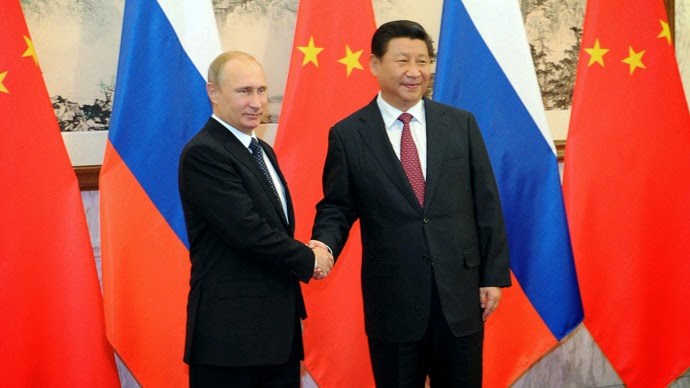As this post is being written, many eyes are still pointing in disbelief at the US-China deal on climate change that presidents Barack Obama and Xi Jinping closed on November 12. In the deal, Mr. Xi promised that his country's GHG emissions would "peak around 2030," while Mr. Obama pledged a 26-28 percent cut in US GHG emissions by 2025 from their 2005 levels. Let us not discuss whether the deal will suffice to stop global warming at 2 degrees Celsius from pre-industrial levels, or whether it will even take off before being killed by the recently emboldened Republican congress. Instead, let us focus on what - or who - made this deal possible. And I am not talking about Mr. Obama and his famed diplomatic skills, or Mr. Xi and his vision. Rather, I am talking about the benevolent monarch-turned-green-activist that is Vladimir Putin, who is merely showing to us all how much he loves our planet. And love, as Mr. Putin put it on November 7, is the meaning of life.
Yes, this is (almost) not a joke. Vladimir Putin, Russia's president, is in fact the man pulling the strings behind the US-China deal. To see why, let us dig deeper into recent events. After his annexation of Crimea this March, Vladimir Putin has found himself in a difficult economic situation due to the sanctions (however feeble) initiated by the United States and their mostly European allies. To increase his cash-flow and decrease his dependence on gas exports to malicious Europe, Mr. Putin signed a deal with China this May to supply it with 38 billion cubic meters of natural gas a year. On November 9 (two days after declaring love to be the meaning of life), he signed another deal for a further 30 billion cubic meters per year. Together, these two deals amount to nearly half of Russia's yearly gas exports to the EU.
This new, enormous supply of gas gives China a unique opportunity to decrease its colossal dependence on coal: China generates around 80% of its electricity using coal and, together with India, adds three new coal-fired power plants every week to its grid to satisfy its rapidly rising energy demand. From an environmental point of view, coal is by far the worst fuel we have. Burning it not only releases copious amounts of dust, sulphur, and other nasty chemicals, but also 25% more greenhouse gases than burning gasoline and twice as many greenhouse gases as burning natural gas.
And here is where Mr. Putin's gas deal comes in: the 68 billion cubic meters of gas from Russia will displace the burning of coal in China - and a lot of it at that. It will enable China to displace between 150 and 180 million metric tons (Mt) of CO2 equivalent greenhouse gases (CO2e) per year. That is because in order to produce the same amount of electricity that the burning of the Russian gas can produce, China would need to burn coal that would release some 300 Mt CO2e annually. Burning the 68 billion cubic meters of Russian gas instead will release only between 120 and 150 Mt CO2e per year. To put things into perspective, it took the EU four years between 2009 and 2012 to achieve a reduction of this scale in its greenhouse gas emissions as part of its famed ETS.
 |
| Vladimir Putin and Xi Jinping after signing their second mega deal on gas. Source: Russia Today. |
Now back to the US-China deal. China would not agree to a deal if it did not believe that it can stop its emissions from rising by 2030 without incurring additional costs. It would not believe that it can stop its emissions from rising by 2030 if it did not have access to large amounts of cleaner sources of energy (together with an economy that is expected to peak at around 2030 as well, of course). Russian gas is, at least in part, just the assurance that China needed to agree to a deal with the US.
Let us now summarize. On November 7, Mr. Putin declared love to be the meaning of life. To put his words into action, he showed his love for our planet on November 9 by signing a huge gas deal with China, which allows China to slow down the rise in its greenhouse gas emissions. This in turn helped give China the confidence to agree on a climate deal with the US on November 12. Oh, love is in the air, and all thanks to Mr. Putin, the humble, benevolent monarch-turned-green-activist. A few more Crimean crises and the problem of global warming will be all but over. And Moscow will be the capital of Europe.













